Another great interview with Bryan Stevenson (excerpt below):
Part of our work is aimed at trying to re-engage this country with an awareness and understanding of how our history of racial inequality continues to haunt us. I don’t think we’re free in America — I think we’re all burdened by this history of racial injustice, which has created a narrative of racial difference, which has infected us, corrupted us, and allowed us to see the world through this lens. So it becomes necessary to talk about that history if we want to get free.
...
This process of truth telling will push some people to try to deny it. And if there’s not complete denial, there’s certainly no shame. You’d be hard pressed to find anything that looks like a public expression of shame about slavery, or lynching, or segregation.
When we present the history, people have a hard time saying it didn’t happen, they just say we shouldn’t talk about it. When we tried to put up markers in downtown Montgomery, local historical officials said it would be “too controversial” to put up markers that talk about slavery. They didn’t say that didn’t happen, they just said it would be controversial, it would be unsettling, it would be uncomfortable for people to be reminded of slavery even though we have 59 markers and monuments to the Confederacy in the same space.
...
I don’t think there’s any question that our failure to deal honestly with this history has made us vulnerable to tolerating bias and discrimination in virtually every sector. It’s not just the overt acts of hate that we see on campuses — although I think those are a direct manifestation of this. It’s also the way in which you can have the Bureau of Justice Statistics saying that one in three black male babies is expected to go to jail or prison during his lifetime and nobody cares. That’s not a policy or a political issue that our leaders are talking about. There is a presumption of dangerousness and guilt that gets assigned to black or brown people and people just see that as well, that’s America. We tolerate bias and discrimination and bigotry in ways that we wouldn’t tolerate them if we had a higher shame index about our history.
That certainly is evident in the way we’ve seen some of this rhetoric and demonization of people based on their ethnicity or religion or any of these other things; that’s clearly an example of that. But it manifests in other ways too. That the two largest high schools in Montgomery are Robert E. Lee High and Jefferson Davis High is a manifestation of this failure to confront history. That people are actually trying to eliminate the Voting Rights Act is a manifestation of this history. That people resent when we talk about bias and discrimination because they think that’s all we talk about is a manifestation of this history. I think it’s hard to find things that are not implicated by our failure to deal with this history more honestly. I really can’t identify many parts of our popular life, our cultural life, our social or political life, that are not haunted by this history of racial inequality.

